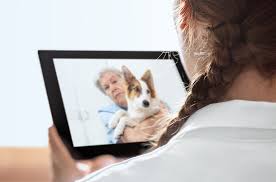Anthony S. Johnson on How COVID-19 is Affecting the Veterinary Industry
Anthony S. Johnson has been practicing veterinary medicine for twenty-five years, and his specialty in emergency and critical care has been a passion since the beginning. His expertise has led him to academic appointments at Purdue University in Indiana and many other prestigious appointments running various emergency departments across the United States, including cities in Indiana, Illinois, and Maryland. In all his time practicing veterinary medicine, Dr. Anthony S. Johnson has never seen such rapid change to the industry as during the COVID-19 pandemic.
Online Assessments

In order to protect staff, patients, and animal owners from the novel coronavirus, many veterinary clinics and emergency centers are limiting in-person assessments to critical cases only. Social distancing within clinics can be difficult, especially when a beloved pet is unwell. However, many pet owners may now find that their veterinarian is open to discussing ailments over the phone, particularly if they have been consistently treating your pet for a chronic problem.
The United States Food and Drug Administration (FDA) governs some aspects of veterinary medicine. In March, it announced that it would be relaxing its enforcement of regulations regarding telemedicine, allowing veterinarians like Dr. Anthony S. Johnson to continue to provide care from a distance.
“Veterinarians can now prescribe extralabel medications to patients over the phone and discuss and change prescribed diets,” explains Dr. Johnson. They can also authorize the use of some additional medications in animals' feed to combat a variety of ailments.
Limiting In-Person Visits
“In some cases, your pet may still be able to see your veterinarian, but you may be asked to remain outside,” says Dr. Anthony S. Johnson. Many clinics are adopting practices where the pet or larger animal may be admitted to the clinic for examination while the owner waits in the car or goes home. The pet's condition can still be discussed over the phone or video conference with the owner, allowing the safest possible interactions for the humans involved. This way, the pet can still get the care it requires, while reducing risk for the caregivers.
Luckily, the Centers for Disease Control (CDC) have assured the public that while domestic pets, particularly dogs, can contract a respiratory version of coronavirus, it has historically differed from the version posing significant risk to humans. This reduces the risk to staff handling pets and other animals in physical distancing situations from other humans. However, Dr. Anthony D. Johnson warns fellow veterinary professionals to be prepared as many clients may feel the need to request their pets get tested, particularly if a member of the household has contracted the virus or there are members of the family at risk (i.e. Elderly or immunocompromised). Taking stock of necessary testing equipment and materials and ensuring preparedness among veterinarians and staff is the best way to stay ahead of the problem, assures Dr. Johnson.
Understaffed Emergency Settings
In the emergency care setting, you may find some centers temporarily understaffed, Dr. Johnson suggests. Like you, those working in veterinary settings may be facing personal difficulty when it comes to their ability to work, whether it is a regular practice or emergency facility. With schools and daycares closed, office managers, vet techs, and even the veterinarians themselves may be struggling to juggle the different parts of their lives. “Rest assured,” says Dr. Johnson. “Those who do work in veterinary medicine are generally very committed. You and your pet will always be important to them.” Even during stressful times, it's important to remember our collective humanity and try to have patience.
In the states where Dr. Anthony S. Johnson has worked, including Illinois and Indiana, establishing a veterinary-client-patient relationship or VCPR via telephone, Internet, or video conference is prohibited by law. Veterinarians in these states are required to perform in-person exams. This may be the case in your home state too. Depending on where you live, you may still be required to bring your pet to the veterinary clinic for assessment. In these cases, be prepared to remain six feet away from other patients, office staff, techs, and the veterinarian where possible. Wear a mask or face covering to protect both yourself and those around you. Wash your hands frequently and be respectful of the space around you. These courtesies will make the process run more smoothly and will allow clinic staff to assist everyone more efficiently and safely.
“The state of emergency in many regions across the United States is changing the way we do things in every industry,” says Dr. Anthony S. Johnson. The protocols and requirements can change at any given time. It's important to ask your veterinarian what their safety measures are before arriving for appointments. Staff may inform you of the current regulations and options over the phone, but if you are unsure, simply ask. Cooperating with safety measures and being as flexible as possible will ensure your pet gets the best care in the safest, most efficient way possible as the world combats COVID-19.
839GYLCCC1992




Leave a Reply